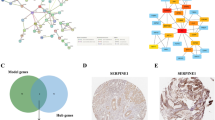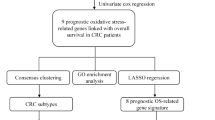Abstract
Background
Colon cancer is one of the most prevalent cancers of the digestive tract. There is mounting evidence that genes associated with oxidative stress might affect the tumour immune microenvironment during tumour growth, maintenance, and treatment response. However, how oxidative stress-related genes affect prognostic importance, tumour microenvironment features, and treatment outcomes in colon cancer patients has not been fully elucidated.
Methods
The Cancer Genome Atlas (TCGA) dataset was used to construct a signature model and nomogram using step and Cox regression approaches to investigate how gene expression affected immunological responses to colon cancer, including the degree of immune infiltration, MSI, and drug sensitivity.
Results and conclusions
The nomogram and the signature model had strong prognostic potential for colon cancer, with gene expression highly correlated with multiple immune cells. The first signature model and nomogram including oxidative stress-related genes were constructed for use in clinical decision-making. In addition, SRD5A1, GSR, TXN, TRAF2 and TRAP1 were identified as potential biomarkers for colon cancer diagnosis and indicators for immunotherapy.








Similar content being viewed by others
Availability of data and materials
The datasets used and/or analysed during the current study available from the corresponding author on reasonable request.
References
Alorda-Clara M, Torrens-Mas M, Morla-Barcelo PM, Roca P, Sastre-Serra J, Pons DG, Oliver J (2022) High Concentrations of Genistein Decrease Cell Viability Depending on Oxidative Stress and Inflammation in Colon Cancer Cell Lines. Int J Mol Sci 23.
Banerjee A, Pathak S, Subramanium VD, Dharanivasan D, Murugesan R, Verma RS (2017) Strategies for targeted drug delivery in treatment of colon cancer: current trends and future perspectives. Drug discovery today 22:1224–1232
Barrett CW, Short SP, Williams CS (2017) Selenoproteins and oxidative stress-induced inflammatory tumorigenesis in the gut. Cell Mol Life Sci: CMLS 74:607–616
Cappell MS (2008) Pathophysiology, clinical presentation, and management of colon cancer. Gastroenterol Clin North Am 37:1–24
Chen X, Li P, Yang Z, Mo WN (2013) Expression of fragile histidine triad (FHIT) and WW-domain oxidoreductase gene (WWOX) in nasopharyngeal carcinoma. Asian Pacific J Cancer Prevent: APJCP 14:165–171
Chen X, Wang Z, Yan Y, Li P, Yang Z, Qin L, Mo W (2014) XRCC3 C18067T polymorphism contributes a decreased risk to both basal cell carcinoma and squamous cell carcinoma: evidence from a meta-analysis. PLoS One 9:e84195
Chen X, Qin L, Li P, Mo W (2016) Cyfip1 is downregulated in acute lymphoblastic leukemia and may be a potential biomarker in acute lymphoblastic leukemia. Tumour Biol 37:9285–9288
Chen F, Li Z, Zhou H (2019) Identification of prognostic miRNA biomarkers for predicting overall survival of colon adenocarcinoma and bioinformatics analysis: a study based on The Cancer Genome Atlas database. J Cell Biochem 120:9839–9849
Coebergh van den Braak RRJ, Sieuwerts AM, Lalmahomed ZS, Smid M, Wilting SM, Bril SI, Xiang S, van der Vlugt-Daane M, de Weerd V, van Galen A, Biermann K, van Krieken J, Kloosterman WP, Foekens JA, Martens JWM, JNM IJ (2018) Confirmation of a metastasis-specific microRNA signature in primary colon cancer. Sci Rep 8:5242.
Dienstmann R, Salazar R, Tabernero J (2015) Personalizing colon cancer adjuvant therapy: selecting optimal treatments for individual patients. J Clin Oncol 33:1787–1796
Gangadhar T, Schilsky RL (2010) Molecular markers to individualize adjuvant therapy for colon cancer. Nat Rev Clin Oncol 7:318–325
Jin X, Yin S, Zhang Y, Chen X (2018a) Association between TLR2 + 2477G/A polymorphism and bacterial meningitis: a meta-analysis. Epidemiol Infect 146:642–647
Jin X, Yin S, Zhang Y, Chen X (2018b) Quantitative assessment of the association between IL-10 -592 A/C polymorphism and Kawasaki disease risk in Chinese population: evidence from a meta-analysis. Cardiol Young 28:811–815
Lannagan TR, Jackstadt R, Leedham SJ, Sansom OJ (2021) Advances in colon cancer research: in vitro and animal models. Curr Opin Genet Dev 66:50–56
Lei L, Yang J, Zhang J, Zhang G (2021) The lipid peroxidation product EKODE exacerbates colonic inflammation and colon tumorigenesis. Redox Biol 42:101880
Liu X, Duan B, Dong Y, He C, Zhou H, Sheng H, Gao H, Zhang X (2014) MicroRNA-139-3p indicates a poor prognosis of colon cancer. Int J Clin Exp Pathol 7:8046–8052
Pinzon-Daza ML, Cuellar-Saenz Y, Nualart F, Ondo-Mendez A, Del Riesgo L, Castillo-Rivera F, Garzon R (2017) Oxidative stress promotes doxorubicin-induced pgp and BCRP expression in colon cancer cells under hypoxic conditions. J Cell Biochem 118:1868–1878
Prasad S, Gupta SC, Tyagi AK (2017) Reactive oxygen species (ROS) and cancer: Role of antioxidative nutraceuticals. Cancer Lett 387:95–105
Vilar E, Gruber SB (2010) Microsatellite instability in colorectal cancer-the stable evidence. Nat Rev Clin Oncol 7:153–162
Xie B, Zhao R, Bai B, Wu Y, Xu Y, Lu S, Fang Y, Wang Z, Maswikiti EP, Zhou X, Pan H, Han W (2018) Identification of key tumorigenesisrelated genes and their microRNAs in colon cancer. Oncol Rep 40:3551–3560
Xu M, Kuang Y, Wang M, Han X, Yang Q (2017) A microRNA expression signature as a predictor of survival for colon adenocarcinoma. Neoplasma 64:56–64
Yan S, Dang G, Zhang X, Jin C, Qin L, Wang Y, Shi M, Huang H, Duan Q (2017) Downregulation of circulating exosomal miR-638 predicts poor prognosis in colon cancer patients. Oncotarget 8:72220–72226
Zhang H, Wang Z, Ma R, Wu J, Feng J (2018) MicroRNAs as biomarkers for the progression and prognosis of colon carcinoma. Int J Mol Med 42:2080–2088
Acknowledgements
We acknowledge some students from the Zhejiang Provincial People’s Hospital for kind support.
Funding
No external funding received to conduct this study.
Author information
Authors and Affiliations
Contributions
Meihua Gai conceived study design and content concept; Xiaoyan Wu and Zheng Zhu performed the data collection, extraction and analyzed the data. Meihua Gai interpreted and reviewed the data and drafts.
Corresponding author
Ethics declarations
Conflict of interest
The authors declare that they have no competing interests.
Additional information
Publisher's Note
Springer Nature remains neutral with regard to jurisdictional claims in published maps and institutional affiliations.
Rights and permissions
Springer Nature or its licensor (e.g. a society or other partner) holds exclusive rights to this article under a publishing agreement with the author(s) or other rightsholder(s); author self-archiving of the accepted manuscript version of this article is solely governed by the terms of such publishing agreement and applicable law.
About this article
Cite this article
Wu, Xy., Zhu, Z. & Gai, Mh. Prognostic modelling of colorectal cancer based on oxidative stress-related genes. J Cancer Res Clin Oncol 149, 10623–10631 (2023). https://doi.org/10.1007/s00432-023-04914-9
Received:
Accepted:
Published:
Issue Date:
DOI: https://doi.org/10.1007/s00432-023-04914-9




